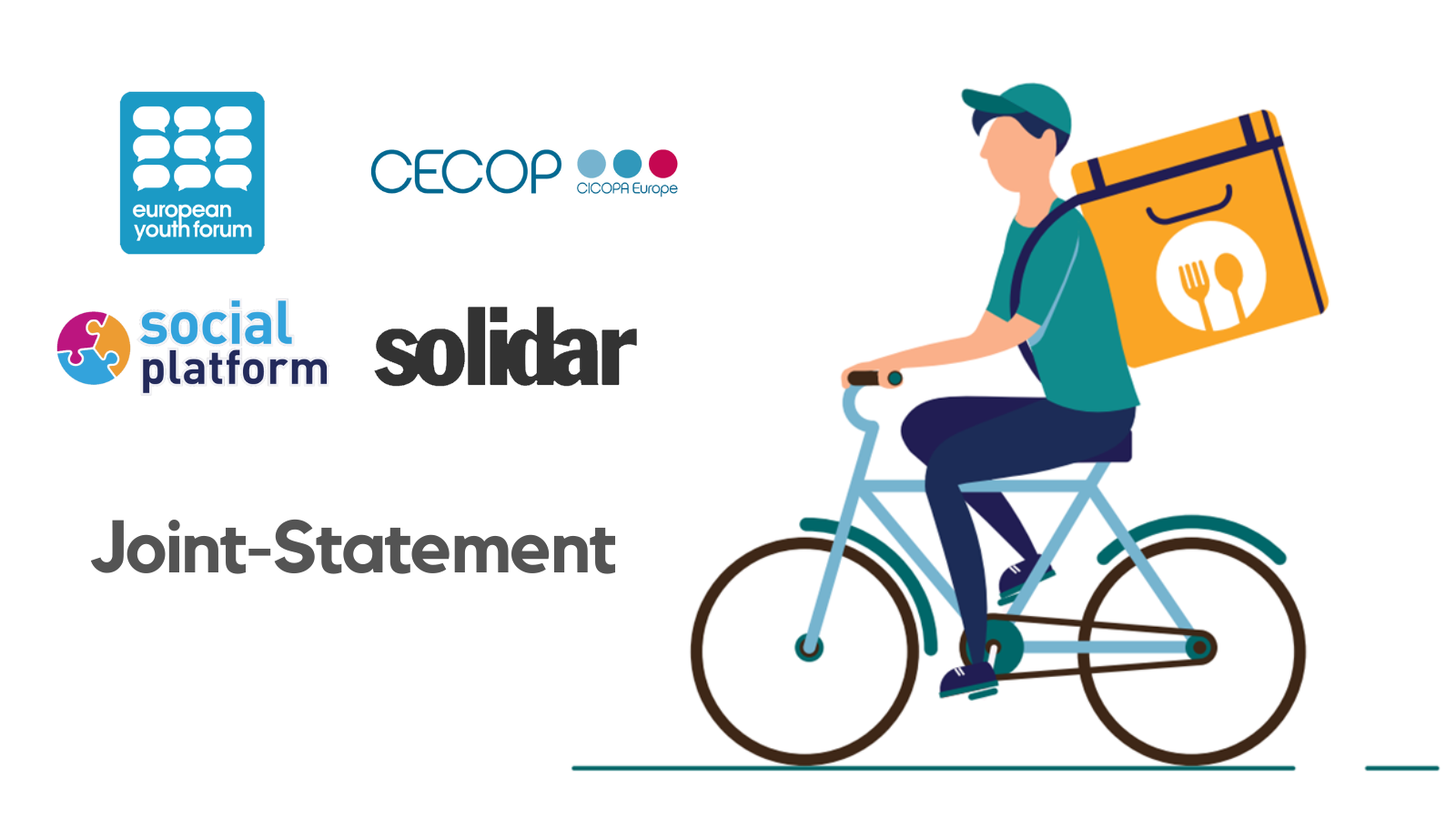CECOP, The European Youth Forum, Solidar and the Social Platform have co-signed a joint statement to the European Institution that are about to begin the interinstitutional negociations on the Directive to improve the working conditions in platform work. Below the full statement.
--
Platform Work Directive trilogues: An opportunity to make a difference
Download the Joint Statement in PDF

As an alliance of civil society organisations and cooperative enterprises, and ahead of the interinstitutional negotiations starting on 11 July, we call on the European Parliament, the Council, and the European Commission to adopt an ambitious Directive on improving working conditions in platform work. As it stands, platform workers are often subjected to some of the most egregious violations of workers’ rights to be found in contemporary labour markets. The adoption of a strong Directive will contribute to advancing the European Social Model, would be in-line with the ambitions of the European Pillar of Social Rights, and the values enshrined under Article 2 TEU.
The misclassification of the employment relationship has led to a number of regressive consequences for platform workers including health and safety issues, unfair wages, unpaid working time, and unlimited or undefined working hours. Moreover, algorithm management systems have led to opaque and unsustainable rating systems and discrimination. The existing profile of a large portion of platform workers is closely tied to that of vulnerable workers, i.e. with limited acquired formal education and/or from marginalised groups, such as racial and ethnic minorities, who make up 55% of platform workers. The poor working conditions mentioned above therefore amplify and reinforce many of the pre-existing vulnerabilities already faced by such groups. This is not only to the detriment of workers, however, but also enterprises applying higher social standards such as platform cooperatives, and society at large.
We are concerned that the position adopted by the Council weakens the presumption of employability of platform workers. It waters down the initial proposal from the European Commission by increasing the number of criteria that needs to be met to trigger the presumption from 2 to 3 and in enlarging the list of predefined criteria from 5 to 7. In addition, it includes a number of derogations for Member States, going against the original objective of achieving a level playing field and failing to establish a minimum floor of rights across the EU. The European Parliament position represents a better way forward by including a rebuttable presumption of employment, while also providing criteria to determine if someone is genuinely self-employed.
The EU and its Member States have the opportunity to reformulate the world of platform work, by transforming it into a fairer platform economy that champions social rights - including via digitalisation, respects working conditions, and is co-developed with workers and trade unions. Negotiators can make a positive difference in shaping how platform work guarantees quality working conditions for all. We call on the EU and its Member States to include in the Directive:
- A rebuttable presumption of employment with a reversed burden of proof. Those working for digital labour platforms must be recognised as workers without having to go through lengthy proceedings. In contrast, workers who are genuinely self-employed must not be, legally or in practice, controlled by and subordinated to the platforms.
- The burden of proof must be on the platform and not on individual workers or administrative or judicial authorities. Workers doing the same work for the same digital labour platform must have the same employment status.
- Any use of algorithms by platforms must be done so in a transparent way, with clear explanations on which decisions are being made by algorithms, to ensure fair working conditions. Decisions like ending an employment relationship cannot be left to an algorithm or any other artificial intelligence (AI) mechanism.
- Unilateral social protection schemes by digital labour platforms should be considered as proof of their position as employers.
- A level playing field vis-à-vis businesses that apply higher social standards, such as platform cooperatives.
- The protection and promotion of cooperatives as a solution to improving the conditions of persons performing platform work.
The importance of achieving an ambitious Directive cannot be underestimated. As aforementioned, platform workers are often subjected to some of the worst violations of workers rights to be found in the world of work and disproportionately consist of vulnerable populations, including youth, racialised persons and undocumented migrants. EU negotiators must ensure that the shape and form of the Platform Work Directive is ambitious enough to make significant inroads towards improving the working conditions of platform workers. At a time when the platform economy is due to grow by 52% in the coming years - a golden opportunity exists to make a real difference for platform workers, and those to come.
***







 Employment & Social Inclusion
Employment & Social Inclusion  Entrepreneurship
Entrepreneurship

